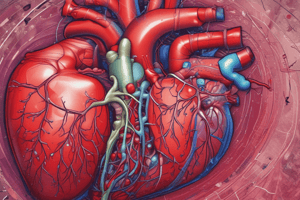Podcast
Questions and Answers
What is the primary cause of angina pectoris?
What is the primary cause of angina pectoris?
- Insufficient coronary blood flow (correct)
- Complete blockage of coronary arteries
- Inadequate myocardial oxygen consumption
- Accumulation of lactic acid
Which risk factor is NOT associated with angina?
Which risk factor is NOT associated with angina?
- Regular physical activity (correct)
- Obesity
- Diabetes
- High cholesterol
What type of angina is associated with atheromatous plaques that partially occlude one or more coronary arteries?
What type of angina is associated with atheromatous plaques that partially occlude one or more coronary arteries?
- Variant angina
- Microvascular angina
- Unstable angina
- Atherosclerotic angina (correct)
What type of pain is characteristic of atherosclerotic angina?
What type of pain is characteristic of atherosclerotic angina?
What percentage of angina cases does atherosclerotic angina constitute?
What percentage of angina cases does atherosclerotic angina constitute?
What is the main cause of vasospastic angina?
What is the main cause of vasospastic angina?
Which of the following is NOT a pharmacologic therapy for angina?
Which of the following is NOT a pharmacologic therapy for angina?
What is the primary role of nitric oxide (NO) in the cardiovascular system?
What is the primary role of nitric oxide (NO) in the cardiovascular system?
What was prescribed to Alfred Nobel to ease his chest pain when he developed angina in 1890?
What was prescribed to Alfred Nobel to ease his chest pain when he developed angina in 1890?
Why should nitroglycerin tablets be kept in tightly closed glass containers?
Why should nitroglycerin tablets be kept in tightly closed glass containers?
Flashcards are hidden until you start studying
Study Notes
Angina Pectoris
- Primary cause of angina pectoris: reduction in blood flow to the heart muscle due to coronary artery disease
Risk Factors
- NOT associated with angina: unknown
Types of Angina
- Atherosclerotic angina: associated with atheromatous plaques that partially occlude one or more coronary arteries
- Characteristic pain of atherosclerotic angina: squeezing, pressure, or tightness in the chest, arm, or jaw
- Atherosclerotic angina constitutes: approximately 90% of angina cases
Vasospastic Angina
- Main cause: coronary artery spasm
- Pain pattern: recurrent episodes of chest pain at rest, often during the night or early morning hours
Pharmacologic Therapy for Angina
- NOT a pharmacologic therapy for angina: antibiotics
Nitric Oxide (NO)
- Primary role in the cardiovascular system: vasodilation, reducing blood pressure
Historical Note
- Alfred Nobel's treatment for angina in 1890: nitroglycerin
Nitroglycerin
- Storage requirements: tightly closed glass containers to prevent degradation by moisture and light
Studying That Suits You
Use AI to generate personalized quizzes and flashcards to suit your learning preferences.





